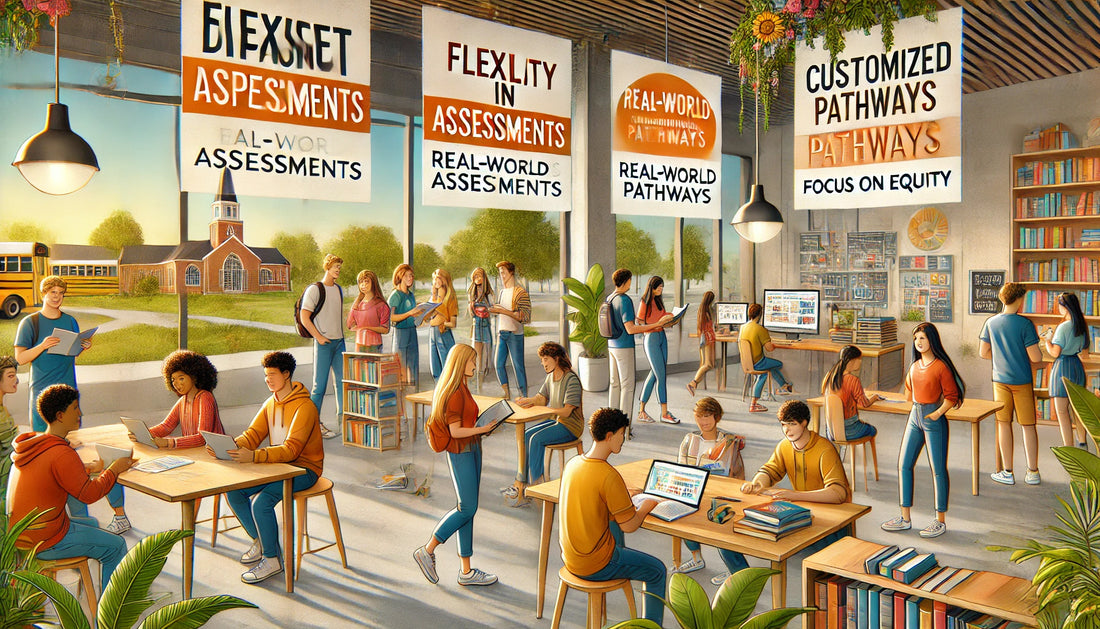
A Big Change Coming to education & Schools in New York State!
Share
As education evolves to better meet the needs of students, New York State's bold shift under the Graduation Measures Initiative is sparking discussions on the future of learning and assessment. The new Sunset Diploma Assessment Requirements bring an innovative approach to education, replacing traditional Regents exams with more inclusive and flexible ways to measure student success. This blog unpacks these changes and explores how entrepreneurs can capitalize on these developments by contributing to financial literacy education.
What Are the Sunset Diploma Assessment Requirements?
The Sunset Diploma Assessment Requirements eliminate the necessity for students to pass Regents exams or a +1 Pathway Assessment to earn a diploma. Instead, the state is moving towards more holistic, competency-based pathways. These changes emphasize:
- Flexibility in Assessment: Students can showcase their knowledge through alternative means such as portfolios, capstone projects, coursework, and experiential learning.
- Alignment with Individual Strengths: Pathways can reflect students' interests in areas like the arts, civic readiness, or career and technical education (CTE).
- Continued Use of State Assessments: To meet federal compliance, state tests will still be administered but will no longer serve as rigid graduation benchmarks.
This transformation aims to reduce inequities in education, offering opportunities for all students to excel based on their unique skills and learning styles.
Big Changes Coming to Schools in New York State!
New York is making schools better with a big plan called NY Inspires. The goal is to help all students learn important skills for life, no matter where they live or what they want to do after high school. Here’s what’s happening:
Four Big Changes:
-
New Graduate Goals
Schools will focus on teaching skills beyond just academics. The "Portrait of a Graduate" includes teamwork, communication, critical thinking, and even learning how to adapt to new challenges—skills employers and colleges are looking for! -
New Ways to Earn Credits
Students won’t just learn in the classroom anymore. They can earn credits by working on real-world projects, internships, or even starting their own businesses. Imagine getting school credit for launching a small business or creating an app! -
Fewer Tests, More Creative Learning
Instead of stressing over one big test, students will have more creative ways to show what they know, like presentations, group projects, and hands-on activities. This makes learning more exciting and less about memorizing facts. -
One Diploma, Many Achievements
Every student will earn the same diploma, but they can personalize it with seals like "STEM Excellence" or "Arts Achievement" to highlight their unique strengths. It’s like a badge of honor for their skills and passions!Timeline:
- 2024-2025: Planning and teacher training begin.
- 2025-2027: Schools start trying out the changes with students.
- 2027 and beyond: The new system rolls out fully, with updated transcripts showing all the new skills students learn.
Opportunities for Entrepreneurs in Financial Literacy Education
The transition to broader graduation pathways creates a perfect opportunity for entrepreneurs to offer financial literacy programs that integrate seamlessly into the new educational framework. Here’s how:
-
Complementing Civic Readiness Goals: Entrepreneurs can design financial literacy curricula that help students earn civic readiness credentials. Topics like budgeting, credit management, and investing align with real-world application requirements.
-
Workforce Development Synergy: By providing students with practical financial knowledge, entrepreneurs can bridge the gap between high school and career readiness, making students better prepared for internships and jobs.
-
Alternative Evidence for Competency: Schools might adopt external certifications in financial literacy as alternative proof of competency. Entrepreneurs can offer credentialing programs to meet this demand.
- Support for Educators: Entrepreneurs can develop workshops, tools, and digital platforms to empower educators in delivering effective financial literacy lessons.
What People Are Saying:
- Challenges: Teachers need more training, and schools need money and resources to make these changes fair for everyone.
- Opportunities: Students will have more choices, learn real-world skills, and feel less pressure from tests.
What are your thoughts? use the space below to share.
Sincerely Good Vibes.



